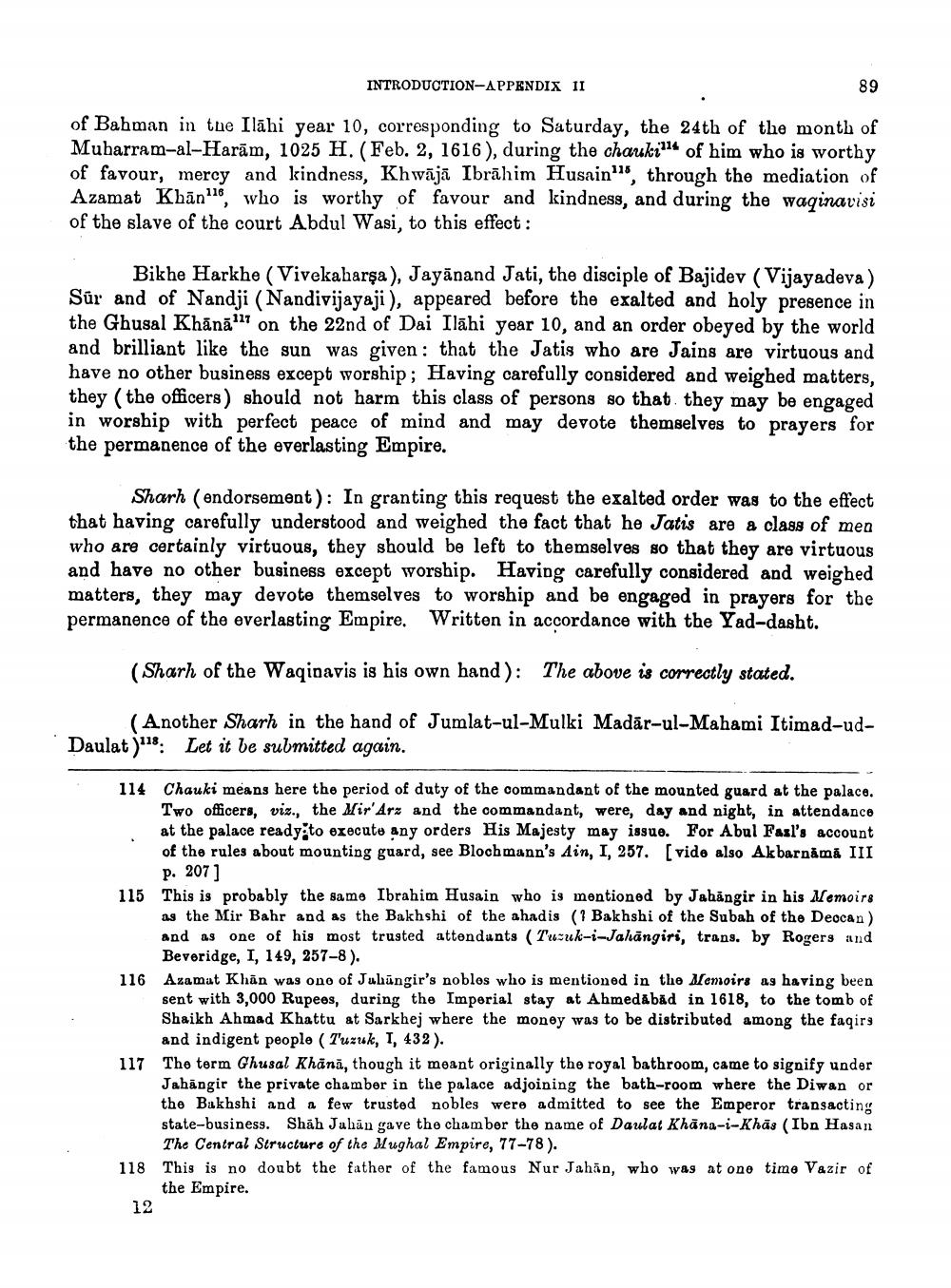________________
INTRODUCTION-APPENDIX II
89
of Bahman in the Ilāhi year 10, corresponding to Saturday, the 24th of the month of Muharram-al-Harām, 1025 H. (Feb. 2, 1616), during the chauki of him who is worthy of favour, mercy and kindness, Khwājā Ibrāhim Husain", through the mediation of Azamat Khān", who is worthy of favour and kindness, and during the waqinavisi of the slave of the court Abdul Wasi, to this effect:
Bikhe Harkhe (Vivekaharşa), Jayānand Jati, the disciple of Bajidev (Vijayadeva) Sur and of Nandji (Nandivijayaji), appeared before the exalted and holy presence in the Ghusal Khānā "17 on the 22nd of Dai Ilāhi year 10, and an order obeyed by the world and brilliant like the sun was given : that the Jatis who are Jains are virtuous and have no other business except worship; Having carefully considered and weighed matters, they (the officers) should not harm this class of persons so that they may be engaged in worship with perfect peace of mind and may devote themselves to prayers for the permanence of the everlasting Empire.
Sharh (endorsement): In granting this request the exalted order was to the effect that having carefully understood and weighed the fact that he Jatis are a class of men who are certainly virtuous, they should be left to themselves so that they are virtuous and have no other business except worship. Having carefully considered and weighed matters, they may devote themselves to worship and be engaged in prayers for the permanence of the everlasting Empire. Written in accordance with the Yad-dasht.
(Sharh of the Waqinavis is his own hand):
The above is correctly stated.
(Another Sharh in the hand of Jumlat-ul-Mulki Madár-ul-Mahami Itimad-udDaulat)** Let it be submitted again.
114 Chauki means here the period of duty of the commandant of the mounted guard at the palace.
Two officers, viz., the Mir' Arz and the commandant, were, day and night, in attendance at the palace ready to execute any orders His Majesty may issue. For Abul Fasl's account of the rules about mounting guard, see Blochmann's Ain, I, 257. [vide also Akbarnāmā III
p. 207] 115 This is probably the same Ibrahim Husain who is mentioned by Jahangir in his Memoirs
as the Mir Bahr and as the Bakhshi of the ahadis (? Bakhshi of the Subah of the Deocan) and as one of his most trusted attendants (Tusuk-i-Jahangiri, trans. by Rogers and
Beveridge, I, 149, 257-8). 116 Azamat Khan was one of Juhangir's nobles who is mentioned in the Memoirs as having been
sent with 3,000 Rupees, during the Imperial stay at Ahmedabad in 1618, to the tomb of Shaikh Ahmad Khattu at Sarkhej where the money was to be distributed among the faqirs
and indigent people ( 7'uzuk, T, 432). 117 The term Ghusal Khānā, though it meant originally the royal bathroom, came to signify under
Jahangir the private chambor in the palace adjoining the bath-room where the Diwan or the Bakhshi and a few trustod nobles were admitted to see the Emperor transacting state-business. Shah Jubün gave the chamber the name of Daulat Khāna-i-Khas (Ibn Hasan
T'he Central Structure of the Mughal Empire, 77-78). 118 This is no doubt the father of the famous Nur Jahān, who was at one time Vazir of
the Empire.
12




